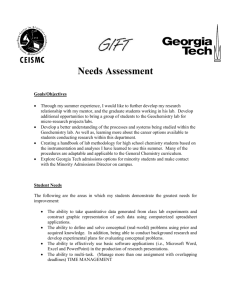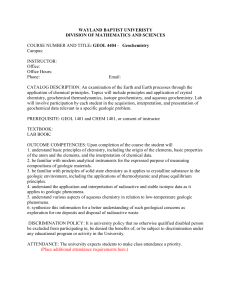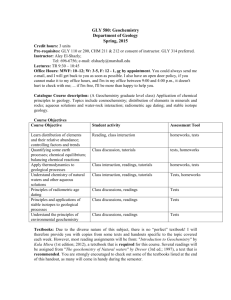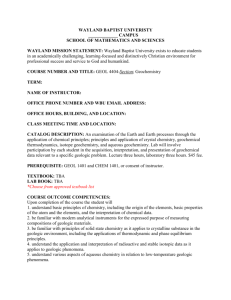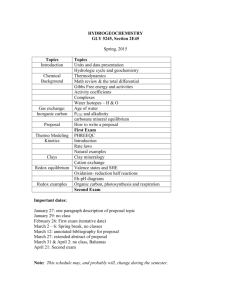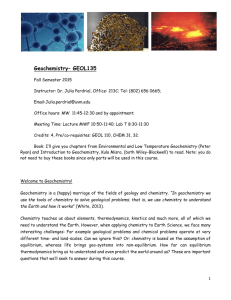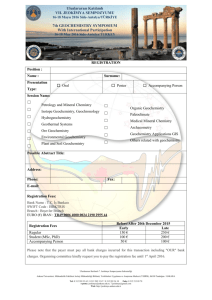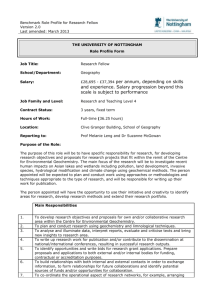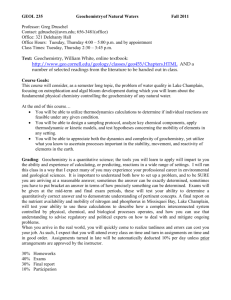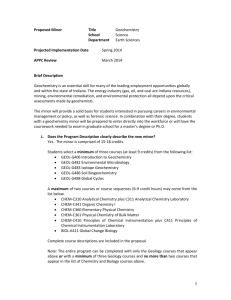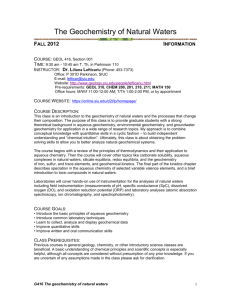Syllabus - Marshall University
advertisement
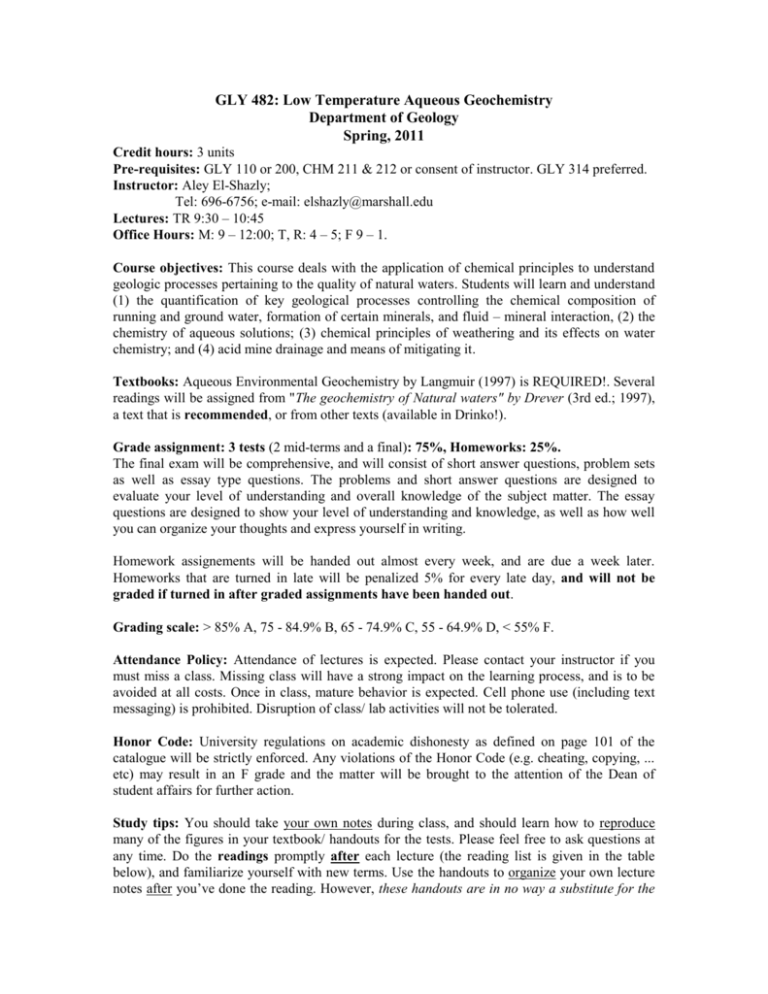
GLY 482: Low Temperature Aqueous Geochemistry Department of Geology Spring, 2011 Credit hours: 3 units Pre-requisites: GLY 110 or 200, CHM 211 & 212 or consent of instructor. GLY 314 preferred. Instructor: Aley El-Shazly; Tel: 696-6756; e-mail: elshazly@marshall.edu Lectures: TR 9:30 – 10:45 Office Hours: M: 9 – 12:00; T, R: 4 – 5; F 9 – 1. Course objectives: This course deals with the application of chemical principles to understand geologic processes pertaining to the quality of natural waters. Students will learn and understand (1) the quantification of key geological processes controlling the chemical composition of running and ground water, formation of certain minerals, and fluid – mineral interaction, (2) the chemistry of aqueous solutions; (3) chemical principles of weathering and its effects on water chemistry; and (4) acid mine drainage and means of mitigating it. Textbooks: Aqueous Environmental Geochemistry by Langmuir (1997) is REQUIRED!. Several readings will be assigned from "The geochemistry of Natural waters" by Drever (3rd ed.; 1997), a text that is recommended, or from other texts (available in Drinko!). Grade assignment: 3 tests (2 mid-terms and a final): 75%, Homeworks: 25%. The final exam will be comprehensive, and will consist of short answer questions, problem sets as well as essay type questions. The problems and short answer questions are designed to evaluate your level of understanding and overall knowledge of the subject matter. The essay questions are designed to show your level of understanding and knowledge, as well as how well you can organize your thoughts and express yourself in writing. Homework assignements will be handed out almost every week, and are due a week later. Homeworks that are turned in late will be penalized 5% for every late day, and will not be graded if turned in after graded assignments have been handed out. Grading scale: > 85% A, 75 - 84.9% B, 65 - 74.9% C, 55 - 64.9% D, < 55% F. Attendance Policy: Attendance of lectures is expected. Please contact your instructor if you must miss a class. Missing class will have a strong impact on the learning process, and is to be avoided at all costs. Once in class, mature behavior is expected. Cell phone use (including text messaging) is prohibited. Disruption of class/ lab activities will not be tolerated. Honor Code: University regulations on academic dishonesty as defined on page 101 of the catalogue will be strictly enforced. Any violations of the Honor Code (e.g. cheating, copying, ... etc) may result in an F grade and the matter will be brought to the attention of the Dean of student affairs for further action. Study tips: You should take your own notes during class, and should learn how to reproduce many of the figures in your textbook/ handouts for the tests. Please feel free to ask questions at any time. Do the readings promptly after each lecture (the reading list is given in the table below), and familiarize yourself with new terms. Use the handouts to organize your own lecture notes after you’ve done the reading. However, these handouts are in no way a substitute for the GLY 482: Low T Aq. Geochem. El-Shazly, A. K., 2011 2 reading assignments! We will be covering many different topics in this class, so I don’t expect you to “like” all of these topics! Final Thoughts: Please keep in mind that I am committed to making this course a positive experience for everyone, so don’t hesitate to ask me questions, or approach me with problems that you are facing in this class. Feel free to stop by my office to discuss your progress in class or go over one of your tests/ homeworks with me (including your final!). I could also arrange for review sessions in the evenings whenever they are needed. Policy for Students with Disabilities: Marshall University is committed to equal opportunity in education for all students, including those with physical, learning and psychological disabilities. University policy states that it is the responsibility of students with disabilities to contact the Office of Disabled Student Services (DSS) in Prichard Hall 117, phone 304 696-2271 to provide documentation of their disability. Following this, the DSS Coordinator will send a letter to each of the student’s instructors outlining the academic accommodation he/she will need to ensure equality in classroom experiences, outside assignment, testing and grading. The instructor and student will meet to discuss how the accommodation(s) requested will be provided. For more information, please visit http://www.marshall.edu/disabled or contact Disabled Student Services Office at Prichard Hall 11, phone 304-696-2271.” 2 GLY 482: Low T Aq. Geochem. El-Shazly, A. K., 2011 3 Geology 482: Low T Aqueous Geochemistry Syllabus Lecture* Topic Reading Assignment 1 Introduction: What is geochemistry - Different fields and applications. Basic chemical principles. Basics of calculus. The Hydrologic cycle: types of water. General Controls on Natural Water Chemistry. Notes; p. 266 - 274 2 Element association & distribution; Mineral and Crystal Chemistry: Ionization Potential, Electron affinity; Valence, Bonding, Oxidation state; Periodic Table; Distribution & Assciation of elements; Coordination numbers, Controls of crystal structures; Isomorphism, Goldschmidt’s rules for substitution; Camouflage, Capture & Admission Chemical equilibrium, The Phase rule, Phase diagrams, Reversible and irreversible chemical reactions, Balancing reactions, Law of Mass Action, Le Chatelier’s principle, Solubility products, Common ion effect, Activity, Fugacity Introduction to thermodynamics: 1st, 2nd, and 3rd laws; Gibbs Free Energy, Enthalpy, Entropy, Heat capacity, thermal expansion, compressibility. Some key relations. Applications. Water Chemistry: Properties of water; Acids & bases; pH, Dissociation constants, Ionic concentrations, Buffers, pH-pC diagrams. Notes 18 - 21 Solution – Mineral equilibria: carbonates; silicates; Chemistry of groundwater; chemistry of seawater, Analysis of water samples, Mixing, Dilution, Evaporation. Activity - activity diagrams. Notes; 274 - 309 22 - 23 23, 24 25 26 - 29 30 - 31 Kinetics: Diffusion; Nucleation; Growth Oxidation and Reduction; Eh – pH diagrams Weathering Clay Minerals; Adsorption – Desorption reactions Acid Mine Drainage: Ch 2 Ch 11 Ch 7 Ch 9 & 10 453 – 474 + Notes 3-8 9 - 12 13 - 17 Final Exam: T May 3, 8:00 – 10:00 a.m. *Lectures are 1 hour 15 minutes each. 3 p. 10 - 32. p. 4 – 10; Notes Ch 4 & 5 GLY 482: Low T Aq. Geochem. El-Shazly, A. K., 2011 4 Some other useful textbooks Krauskopf, K. and Bird, D., 1995. Introduction to Geochemistry. McGraw Hill. Deutsch, W., 1997. Groundwater Geochemsitry: fundamentals and applications to contamination. Lewis publishers, 221 pp. Faure, G., 1998. Principles and applications of Geochemistry. Prentice Hall. Garrels, R. M. and Christ, C. L., 1965. Solutions, Minerals, and Equilibria. Harper & Row. Henderson, P., 1982. Inorganic Geochemistry. Pergamon Press. Kehew, A., 2001. Applied chemical hydrogeology. Prentice Hall. Nordstrom, D. K. and Munoz, J. L., 1986. Geochemical Thermodynamics. Blackwell Scientific Publications. Schultz, H. and Zabel, M. (eds.), 2000. Marine Geochemistry.Springer Verlag, 455 pp. Snoeyink, V. L. and Jenkins, D., 1980. Water Chemistry. John Wiley & Sons. Walther, John, 2007. Essentials of Geochemistry.Jones & Bartlett publishers. Wood, B. J. and Fraser, D. G., 1977. Elementary Thermodynamics for Geologists. Oxford Science Publications, 303 pp. 4
